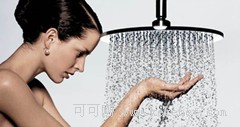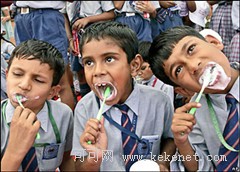(单词翻译:单击)
你肯定不会相信,在我们的日常生活中,有很多简单的事儿其实我们一直都做错了:
From a young age, we're taught that the daily use of a hot shower, copious amounts of soap and a scratchy washcloth are necessary to rid ourselves of dangerous microorganisms.
每个小朋友都被教导说每天用热水洗澡可以去除身上危险的微生物。
As it turns out, showering daily wreaks havoc on something hilariously called the horny layer. Hot water, soap and abrasive surfaces strip off the horny layer, exposing living cells to the elements.
其实每天洗澡会严重破坏身上的角质层。热水、肥皂和搓澡巾会使角质层脱落,让我们的皮肤暴露在外。
So how the hell are we meant to do it?
那我们该怎么洗澡?
The most important thing to do to keep the skin healthy is to preserve the horny layer. Skipping showers gives your skin time to repair some of the damage that the last shower caused.
想要保持皮肤健康,就得保护角质层。少洗几次澡,让皮肤可以自行修复上次洗澡造成的破坏。
Why the hell do you keep waking up at 3 a.m.? If this happens to you often, you're not alone. Chances are, if you mention waking up like this to your doctor, it'll be diagnosed as a "sleep disorder," and you'll be given one of the tens of millions of prescriptions for sleeping pills handed out to people each year.
要是你经常在半夜3点中醒过来,恭喜你,你不是一个人。你的医生可能会把这种情况诊断为“睡眠障碍”,给你开上一堆安眠药。
So how the hell are we meant to do it?
那我们该怎么睡觉?
The idea of the sleep pattern natural to mankind has surprisingly changed from an uninterrupted eight hours to sleeping in segments: three to five hours of sleep, an hour of wakefulness and then another three to five hour nap. This small window of consciousness was renowned as the best time for boning.
8小时无干扰睡眠?过时啦,我们要学会分段睡觉:睡3到5小时,然后保持1个小时的清醒状态,再接着睡上3到5小时。这种1小时的有意识状态被认为是最佳的适应时间。
If you stay calm and allow yourself to fall back to sleep naturally rather than lying there wondering why you're awake, you usually won't see any negative effects the next day.
半夜醒来,请别纠结自己为什么醒了,保持冷静,让自己自然地再睡过去,这样消极情绪就不用影响到你啦。
Traditional wisdom is that we should brush twice a day, after meals. Well, actually, our obsessive-compulsive tooth-brushing practices lead to deteriorating oral health, including increased numbers of cavities and eventual tooth loss.
每天饭后刷牙?传统智慧不管用啦。其实每天的强迫性刷牙会损害口腔健康,造成蛀牙增多和牙齿脱落。
The reason is that the acidity in food and beverages causes tooth enamel to soften, and brushing right after eating an acidic meal strips enamel from the teeth, leaving them vulnerable to cavities. Leaving a little food behind actually doesn't cause as much damage as your toothbrush does as it scrubs the natural protective layer off the teeth.
食物和饮料中的酸性会造成牙齿釉质软化,马上刷牙容易得蛀牙。嘴里留点食物的害处绝对没有马上刷牙大。
So how the hell are we ment to do it?
那我们该怎么刷牙?
Studies show that flossing is much more important than brushing. Dental floss actually removes the bacteria that clump together between your teeth, without scrubbing and stripping layers off them.
用牙线清洁牙齿比刷牙要重要得多。牙线可以在不破坏牙齿保护层的情况下清理牙齿间堆积的细菌。
Long periods of sitting increase your risk of diabetes, heart disease and even cancer, no matter how much you work out when you're not sitting. Sitting down for long periods of time means that you'll probably die earlier. This is all because of the invention of chairs.
长期保持坐姿会增加得糖尿病、心脏病和癌症的风险,甚至可能意味着早死。罪魁祸首是椅子的发明。
When you're sitting on a chair, our abdominal muscles relax, and suddenly your spine alone has to take the entire weight of your upper torso. The extra stress puts pressure on your spinal disks and can eventually lead to chronic back pain.
坐在椅子上,我们的腹部肌肉会放松,整个上半身的重要只能靠脊椎支撑。脊椎间盘上增加的压力会导致慢性背部疼痛。
So how the hell are we meant to do it?
那我们该怎么坐?
Some experts on sitting recommend "active sitting" using an exercise ball, kneeling stool or something else without a high back.
专家建议“积极坐姿”。不管健身球还是凳子,只要没有高靠背就好。
There's another option : lying back at a 135-degree angle with their feet on the floor. : A study used an MRI showed the least spinal disk movement in this position. So try it at work, and be brave to tell your boss you're avoiding future sick days.
还有另外一个选择:脚着地,身体135度仰卧,这样的姿势对脊椎间盘运动要求最少。试试这个姿势,记得告诉你老板,你是在保证将来的身体健康。






